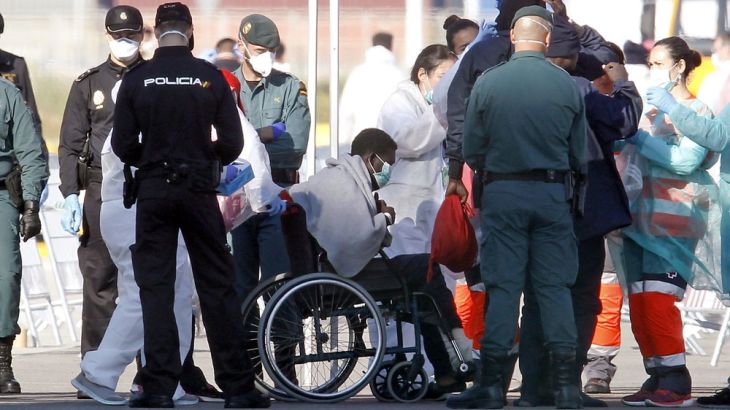Aquarius refugees and migrants disembark in Valencia port
Spain welcomes more than 600 people after Italy’s far-right interior minister refused charity rescue boat.

Valencia, Spain – After a gruelling journey at sea, more than 600 migrants and refugees who have become the centre of a political storm about Europe’s migration policy have set foot on dry land in Spain.
The first batch of migrants made their way slowly down the gangplank of the Italian coastguard ship Datillo in the port of Valencia early on Sunday, more than a week after they were rescued in several operations off the coast of Libya.
Keep reading
list of 4 itemsUK police arrest three over deaths of five people in English Channel
UK passes bill to deport asylum seekers to Rwanda: What’s next?
‘Can’t give them jobs’: Rwandans grapple with fears over UK asylum plan
The MV Aquarius charity rescue docked around two hours after the Datillo and the Orione, another coast guard ship, shortly after.
It marked the close of an exhausting 1,300km ordeal that began when the MV Aquarius charity rescue boat was barred from entering ports in Italy and Malta, leaving the 630 on board, including 100 children and seven pregnant women, stranded at sea.
The refugees arrived in three stages because the two Italian ships had taken on board 400 people from the overburdened rescue boat.
|
|
Since newly appointed Spanish Prime Minister Pedro Sanchez offered a safe harbour to the migrants on Monday, Valencia has rapidly deployed its emergency plans to cater for the refugees.
“Everyone is exhausted and the team is completely stressed,” said Til Rummenhohl, Vice President of SOS Mediterranee, which operates the Aquarius alongside Doctors Without Borders (MSF).
“They have been working 24/7 for a week and [the migrants] are confused. They’ve already passed close to land so many times – at Sardinia and Majorca – and they are wondering why they were still not on land … the mood is not that nice.”
Aloys Vimard, an MSF coordinator who was on board, said that the Aquarius is not a “cruise ship”. The boat is not made accommodate people for more than four days, he said, recalling the image of a woman breastfeeding while seasick.
‘Welcome home’
More than 2,300 people have rallied together to help the exhausted arrivals, including 1,000 Red Cross volunteers, 400 translators and around 450 national police and civil guards.
“Welcome home” read a large banner unfurled at the harbour, translated into five languages for the migrants, who hail from more than 20 countries.
The majority are from sub-Saharan Africa and it is unclear how many will qualify for refugee status, as many are from countries which do not have high asylum approval rates within the European Union (EU).
Those onboard will receive immediate medical attention and psychological assistance from the Red Cross, after which they will be registered by Spanish authorities and transferred to reception centres.
Of the 130 people examined so far, health officials said there were no serious illnesses, but a significant number had suffered mild conditions caused by overcrowding and high temperatures.
Valencia’s authorities have promised that each individual will retain the same translator throughout the registration process, which may last several weeks.
|
|
France will also accept a number of the migrants, Spain’s deputy prime minister Carmen Calvo said on Saturday.
“France will accept migrants who express the wish to go there,” said Calvo.
‘Shameful dispute’
Mathilde Auvillain of SOS Mediteranee, who has volunteered on previous rescue missions aboard the Aquarius, criticised the “shameful dispute” between European leaders this week.
“What these people need is safety,” Auvillain added. “They need protection and what are we talking about? Delaying protection? What’s the point.”
Italy’s far-right interior minister Matteo Salvini, who banned the Aquarius from entry to Italian ports, sparking a diplomatic row with France, has pledged to reject two further Dutch NGO rescue boats who are beginning rescue operations off the coast of Libya.
“Two other ships with the flag of Netherlands, Lifeline and Seefuchs, have arrived off the coast of Libya, waiting for their load of human beings abandoned by the smugglers,” Matteo Salvini, wrote on his Facebook page.
“These gentlemen know that Italy no longer wants to be complicit in the business of illegal immigration, and therefore will have to look for other ports [not Italian] where to go.”
Spain’s maritine rescue service said it saved 933 people in the Mediterranean on Friday and Saturday. It also recovered four bodies.
![Migrants and refugees sing on the deck of MV Aquarius on their way to Spain [SOS/Mediterranee/Reuters]](/wp-content/uploads/2018/06/831515f0b3df4a5a88527e15155c69ea_18.jpeg)